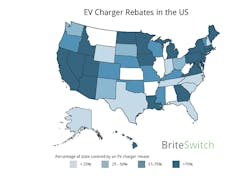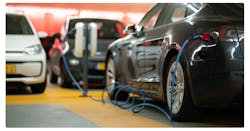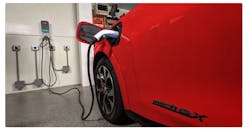All About EV Charger Rebates
Editor's note. Lighting industry veteran Leendert Jan Enthoven founded BriteSwitch, Princeton, NJ, in 2008 to help businesses take advantage of the rebate and incentive programs that exist across the U.S. and Canada. The BriteSwitch database helps electrical contractors, electrical distributors, manufacturers, independent reps and end-users find lighting rebate programs in their region. Leendert has authored several articles for Electrical Wholesaling on lighting rebates, and we are delighted to publish this report on EV rebates. Contact him at [email protected].
Electric vehicle (EV) sales are projected to grow dramatically, with millions more cars coming to the roads in the next few years. But where will these cars charge up? At this moment, the United States has roughly 168,000 gas stations but only 44,417 publicly available EV charging stations. Infrastructure has a long way to go to catch up.
As electrical contractors and electrical distributors start to focus on opportunities in the EV charging market, rebates will likely be a key to their success. Many organizations across the country are providing rebates, incentives and tax credits for installing EV chargers. While many in the industry may be familiar with rebates for equipment like lighting or HVAC that have been around for years, EV charger rebates often work a little differently.
This trend presents a unique opportunity for electrical distributors and electrical contractors. Both homeowners and businesses will be looking to have EV charging stations installed in the coming years to accommodate their new electric cars. Homeowners may seek the convenience of rapidly charging their car at home. Businesses will need a way to keep their electric fleet or their employees’ cars topped up. Places like hotels, restaurants and retail stores might need to add EV chargers to increase traffic and keep customers happy.
AVAILABLE EV CHARGERS
To fully understand rebates and incentives for EV chargers, let’s first review some common terminology. Technically, what most people call “EV chargers” is actually “electric vehicle supply equipment (EVSE).” These stations convert electric power to a format that the electric vehicle can accept; the charger itself is built into the car. That being said, the most popular term for these units is EV chargers. Broadly speaking, EV chargers fall into three categories:
Level 1 chargers - 120V. A Level 1 EV charger plugs into a standard outlet. It’s the type of charger that comes with most EVs. Usually, a Level 1 charger can add 2 miles to 3 miles to a car for each hour they’re connected. These units are primarily used in residential applications.
Level 2 chargers – 240V. A Level 2 EV charger lets users charge up their electric vehicle about five times faster than Level 1 chargers. These chargers use 240V and can be hardwired or use a NEMA 14-50 Plug. They add between 12 miles and 60 miles to a battery each hour. These chargers are the most popular in both residential and commercial applications.
FINDING EV CHARGER INCENTIVES
Rebates and incentives for EV chargers can come from a variety of sources. The most widely available funding source is the Federal 30C Tax Credit, also referred to as the “Alternative Fuel Infrastructure Tax Credit.” This program provides a tax credit of up to $1,000 for residential applications and $30,000 for commercial applications. But that is just the low-hanging fruit, as 57% of the country is also covered by an additional rebate, incentive or grant for EV chargers. These incentives can come from a variety of sources. The most common sponsor is electric utilities, but funding is also available from municipalities, counties, regional programs and states. Currently, 51% of the United States has a rebate for the installation of a commercial EV charger, but eligibility can vary depending on the type.
Level 2 EV chargers are the most commonly incentivized. Almost half of the United States (49%) has a rebate available for this type of equipment. While there is quite a range of dollar amounts, the average rebate for a Level 2 charger is $1,731.
Level 3 commercial EV charger rebates are less popular, with only 38% of the country having an additional incentive available. However, because these charging stations are much more expensive than Level 2 chargers, the incentive can be significantly higher. On average, the rebate for a Level 3/DC fast charger is $37,878.
Important factors to consider. Make sure the EV charger you stock meet the local rebate program’s requirements. For example, some rebate programs require that the charger is networked, usually with Wi-Fi, to report data back. Other programs require that the charger uses a specific rate code or billing plan.
The specific make and model of an EV charger can also matter. Some programs will require a particular brand of charger. Others may have a list of approved equipment. These types of programs are in the minority, with only around 5% of all rebates specifying certain models or brands.
Some EV charger rebate programs have limited funding that goes very quickly. This issue will likely be even more true in the future as EVs grow in popularity. Pay attention to deadlines and make sure to adhere to them. Research the options early on to see if a program currently has a waitlist or will be re-opening in the future.
Summary. It’s hard to tell how long these incentives for EV chargers will last. Historically, rebates for other technologies like lighting, HVAC and other energy-efficient equipment have been around for many years. But EV chargers are different; they don’t provide energy efficiency benefits. Instead, they offer the utility a new way to make revenue. In theory, there will eventually be enough chargers to meet the demand, and these rebates may no longer be needed. Therefore, it’s very likely that early adopters of EV charging will be the only ones to benefit from rebates.
BriteSwitch makes it easy to take advantage of EV charger rebates and incentives. RebatePro is BriteSwitch’s proprietary rebate finding software. Based on our 13 years of experience, the tool has been highly optimized to make finding EV charger rebates and incentives quick and painless. It contains virtually all the rebates, grants and incentives available across the US for installing an EV charger and it’s updated constantly. BriteSwitch can take care of the entire rebate process for you, from estimating the rebate upfront and ensuring eligibility to applying for the approvals, coordinating the inspections and chasing down the final check.
Learn more about RebatePro for EV Chargers at www.briteswitch.com/rebatepro-for-ev-chargers




